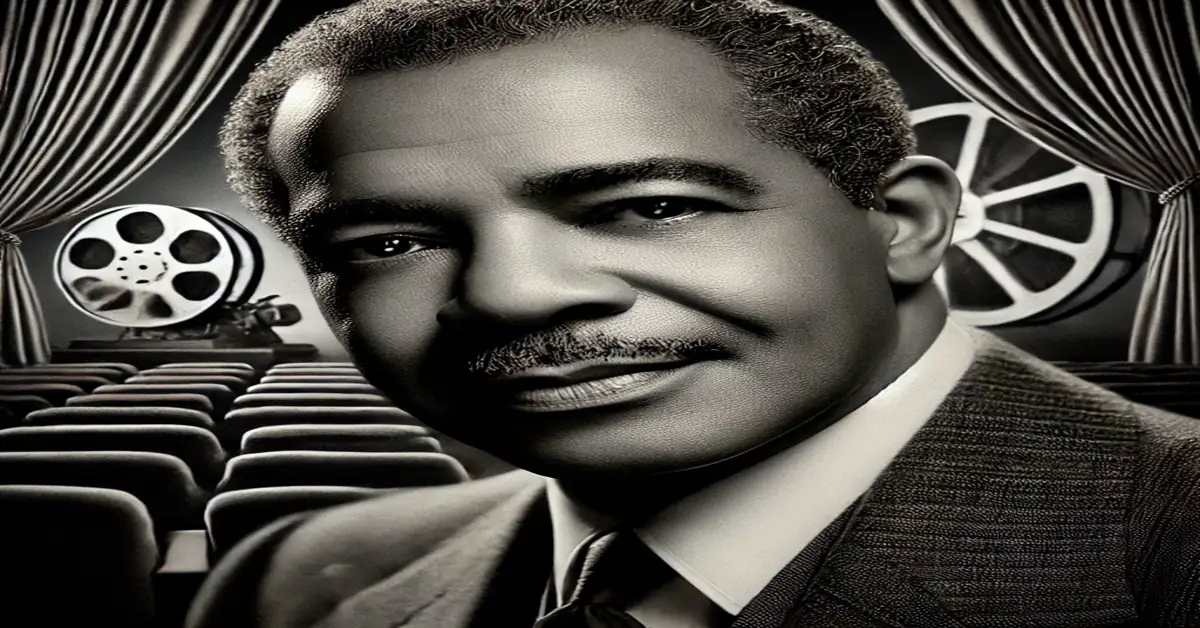Robert Earl Jones was more than just a name in the entertainment industry; he was a powerhouse of talent whose impact resonates to this day. A trailblazer in his craft, Jones carved out a unique space for himself on stage and screen, captivating audiences with his remarkable performances. He navigated through various artistic expressions—acting, voice work, and theater—all while leaving an indelible mark on those who crossed his path. Join us as we explore the life and legacy of Robert Earl Jones—a journey that takes us from his humble beginnings to becoming an enduring figure in American cinema and theatre history.
A Journey Through Time
Robert Earl Jones, born in 1910, emerged as a seminal figure in American theater and film. His contributions to the performing arts are often overshadowed by his son, the legendary James Earl Jones. Yet Robert’s talent paved the way for future generations of actors. He was known not only for his skill but also for his deep commitment to storytelling.
His performances were marked by a commanding presence that drew audiences in from the moment he stepped on stage or appeared on screen. Whether playing dramatic roles or lending his voice to various projects, Robert had an uncanny ability to evoke emotion and captivate viewers.
Beyond acting, Jones made significant strides as a pioneering African American performer during a time when opportunities were limited. His work opened doors for many who followed in his footsteps, creating pathways toward greater representation in film and theater.
His legacy is rich with memorable characters and unforgettable moments that continue to resonate today. The influence of Robert Earl Jones remains palpable within contemporary narratives, inspiring countless artists along their own journeys through time.
READ MORE:NFTRandomize: Redefining Generative Art and Digital Collectibles
Biography
Robert Earl Jones was born on February 3, 1910, in Berkeley, California. He grew up in a world rich with stories and culture that would eventually shape his artistic path. His early life was marked by both challenges and opportunities that led him to the stage.
He began his career in theater during the late 1930s as an actor. His passion for performance drove him from local productions to national recognition. Robert’s distinctive voice and powerful presence made him a memorable figure in both film and television.
Over time, he became known not just for his talent but also for his dedication to the craft of acting. As a black artist during a turbulent era, he broke barriers while paving the way for future generations of actors.
Beyond his work on screen, Robert’s influence extended into teaching and mentoring young talents who sought guidance. He believed deeply in sharing knowledge—an essential part of preserving the art form he loved so much.
Early life
Robert Earl Jones was born on February 3, 1910, in Saratoga Springs, New York. Growing up in a family that appreciated the arts laid the foundation for his future career. His father worked as a laborer while his mother was deeply involved in music and theater.
From an early age, Robert showed an affinity for storytelling and performance. He often entertained friends and family with dramatic tales or impersonations. This passion would eventually guide him towards acting.
Jones faced several challenges as a young Black man during a time of racial segregation. Despite these obstacles, he persevered through determination and hard work. His experiences shaped not only his character but also informed much of his later performances.
By the late 1930s, Robert had relocated to New York City to pursue acting more seriously. It was here that he began to carve out a niche for himself on stage and eventually set the groundwork for what would become an illustrious career in entertainment.
Career
Robert Earl Jones carved out a remarkable career that spanned decades, showcasing his incredible talent across various mediums. He made an unforgettable impact in film, television, and theatre, establishing himself as a versatile performer.
His film career began in the 1960s with roles in classics like “The Great White Hope” and “The Man Who Would Be King.” These performances showcased not only his acting skill but also his ability to command attention on screen. Audiences were captivated by his powerful presence.
Television offered Robert another avenue to shine. He appeared in popular shows such as “The Twilight Zone” and “Good Times,” where he brought depth to each character. His charisma resonated with viewers, allowing him to leave a lasting impression long after the credits rolled.
In addition to screen work, Robert was deeply committed to the stage. His performances on Broadway revealed his passion for live theatre and solidified his status as a formidable actor of his time. Each role was infused with authenticity and emotion, making every performance memorable.
Personal life
Robert Earl Jones led a life that was as rich and textured as his performances. Born in 1910, he grew up in a period marked by profound change and opportunity. His upbringing shaped not only his character but also his approach to acting. He embraced the challenges of his time, which influenced both his personal and professional journey.
Jones married actress Isabel Washington, creating a partnership that blended their passions for the arts. Together, they navigated the ups and downs of show business while raising their son, James Earl Jones. Their bond exemplified mutual respect and creativity within an ever-evolving landscape.
Throughout his life, Robert maintained close ties with family and friends who shared similar artistic aspirations. This support system was vital during tough times when opportunities seemed scarce or uncertain.
His warmth extended beyond the stage; those who knew him often described him as approachable and genuine. These qualities endeared him to colleagues in Hollywood and on Broadway alike, leaving lasting impressions long after he exited the spotlight.
Filmography
Robert Earl Jones made significant contributions to film, showcasing his remarkable talent across various genres. His film career began in the 1950s, and he quickly stood out for his compelling performances that resonated with audiences.
One of his notable roles came in “The Scalphunters” (1968), where he starred alongside legends like Burt Lancaster and Ossie Davis. This Western offered a glimpse into Jones’s ability to adapt to different characters while maintaining authenticity.
Another prominent appearance was in “Field of Dreams” (1989). In this classic film, Robert portrayed the enigmatic character Terence Mann. His performance added depth and charm, enhancing an already iconic story about dreams and redemption.
Jones’s versatility also shone through in lesser-known projects throughout the decades. Each role contributed to a rich tapestry of work that solidified his status as a respected figure in Hollywood history. The impact of his filmography continues to be felt today, inspiring new generations of actors and filmmakers alike.
Television
Robert Earl Jones made significant contributions to television, showcasing his versatility as an actor. His appearances spanned various genres, allowing audiences to appreciate his talent and charm. From drama to comedy, he brought each character to life with a unique flair.
One notable role was in the acclaimed series “The Sopranos.” Here, he played a memorable part that left an indelible mark on viewers. The complexity of his character added depth to the storyline, proving that Robert could captivate audiences even in limited screen time.
Robert Earl Jones also lent his voice and presence to other popular shows throughout the decades. His ability to adapt and evolve with changing times kept him relevant in a competitive industry. Fans remember him fondly for both guest spots and recurring roles alike.
His work on television reflects not just talent but dedication—a commitment that inspired many aspiring actors who followed in his footsteps. Each performance became part of the rich tapestry that defines Robert Earl Jones’ legacy today.
Theatre
Robert Earl Jones made significant contributions to the world of theatre, showcasing his remarkable talent on stage. His performances were often characterized by a commanding presence and deep emotional resonance. Each role he took on left an indelible mark on audiences and critics alike.
His versatility allowed him to traverse various genres, from drama to musicals. Whether portraying a serious character or adding flair to lighter roles, Jones’s ability to adapt was impressive. He had an innate understanding of the nuances required for live performance.
The energy of the stage suited him perfectly; it brought out his best qualities as an actor. Audiences could feel his passion radiating throughout each production. This connection created unforgettable experiences that stayed with viewers long after the curtains fell.
Robert Earl Jones also influenced younger generations of actors through mentorships in local theatres. His legacy continues today as aspiring performers look back at his work for inspiration and guidance in their own careers.
Conclusion
Robert Earl Jones left an indelible mark on the entertainment industry. His journey is a testament to resilience and talent. From humble beginnings, he rose through the ranks to become a celebrated figure in film, television, and theater.
His early life laid the groundwork for his remarkable career. With each role he took on, Jones showcased not just his acting prowess but also his deep understanding of character dynamics. Whether it was on stage or screen, audiences were captivated by his performances.
Jones’s personal life reflected a commitment to family and community. He balanced work with love for those around him, which only enriched his craft further.
The breadth of Robert Earl Jones’s filmography speaks volumes about his versatility as an actor. From classic films to iconic TV shows and stellar theatrical performances, he has contributed immensely to various genres.
While Robert Earl Jones may no longer be with us physically, the legacy he created endures through every piece of art he touched. His influence continues to inspire aspiring actors today—proof that true talent never fades away; it simply transforms into something timeless.
READ MORE:Vudu.com/Start: Activate and Stream Movies Effortlessly









